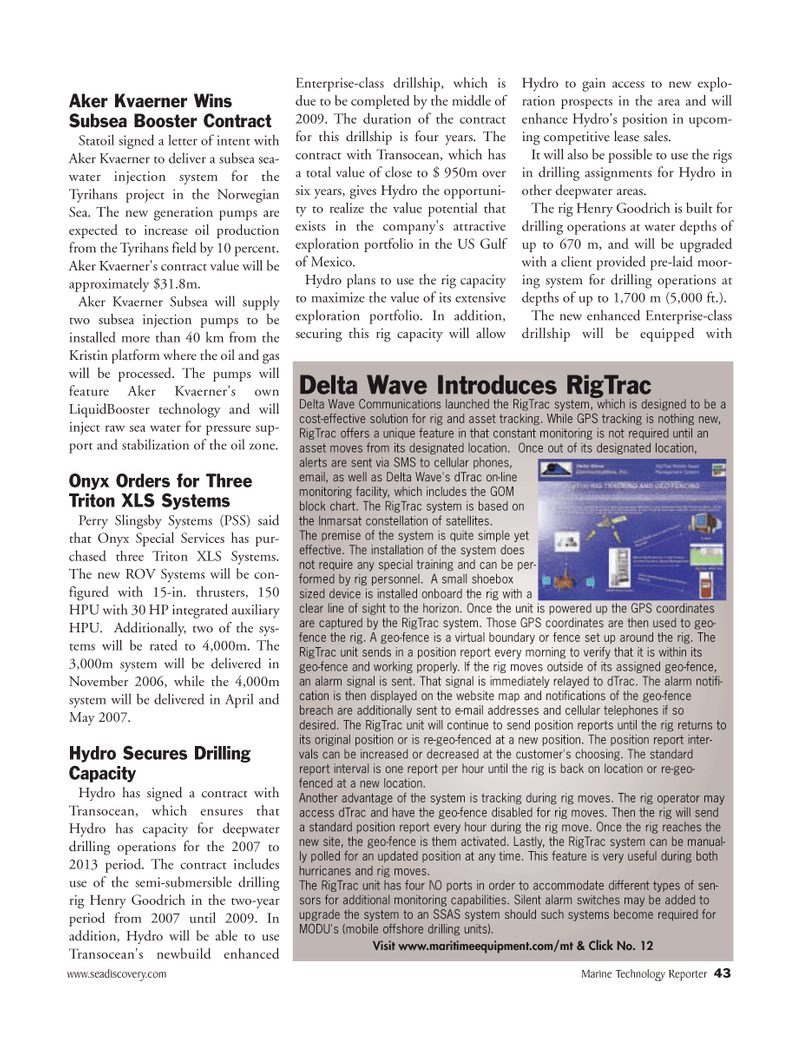
Page 43: of Marine Technology Magazine (July 2006)
Underwater Defense: Port & Harbor Security
Read this page in Pdf, Flash or Html5 edition of July 2006 Marine Technology Magazine
Aker Kvaerner Wins
Subsea Booster Contract
Statoil signed a letter of intent with
Aker Kvaerner to deliver a subsea sea- water injection system for the
Tyrihans project in the Norwegian
Sea. The new generation pumps are expected to increase oil production from the Tyrihans field by 10 percent.
Aker Kvaerner's contract value will be approximately $31.8m.
Aker Kvaerner Subsea will supply two subsea injection pumps to be installed more than 40 km from the
Kristin platform where the oil and gas will be processed. The pumps will feature Aker Kvaerner's own
LiquidBooster technology and will inject raw sea water for pressure sup- port and stabilization of the oil zone.
Onyx Orders for Three
Triton XLS Systems
Perry Slingsby Systems (PSS) said that Onyx Special Services has pur- chased three Triton XLS Systems.
The new ROV Systems will be con- figured with 15-in. thrusters, 150
HPU with 30 HP integrated auxiliary
HPU. Additionally, two of the sys- tems will be rated to 4,000m. The 3,000m system will be delivered in
November 2006, while the 4,000m system will be delivered in April and
May 2007.
Hydro Secures Drilling
Capacity
Hydro has signed a contract with
Transocean, which ensures that
Hydro has capacity for deepwater drilling operations for the 2007 to 2013 period. The contract includes use of the semi-submersible drilling rig Henry Goodrich in the two-year period from 2007 until 2009. In addition, Hydro will be able to use
Transocean's newbuild enhanced
Enterprise-class drillship, which is due to be completed by the middle of 2009. The duration of the contract for this drillship is four years. The contract with Transocean, which has a total value of close to $ 950m over six years, gives Hydro the opportuni- ty to realize the value potential that exists in the company's attractive exploration portfolio in the US Gulf of Mexico.
Hydro plans to use the rig capacity to maximize the value of its extensive exploration portfolio. In addition, securing this rig capacity will allow
Hydro to gain access to new explo- ration prospects in the area and will enhance Hydro's position in upcom- ing competitive lease sales.
It will also be possible to use the rigs in drilling assignments for Hydro in other deepwater areas.
The rig Henry Goodrich is built for drilling operations at water depths of up to 670 m, and will be upgraded with a client provided pre-laid moor- ing system for drilling operations at depths of up to 1,700 m (5,000 ft.).
The new enhanced Enterprise-class drillship will be equipped with
Delta Wave Introduces RigTrac
Delta Wave Communications launched the RigTrac system, which is designed to be a cost-effective solution for rig and asset tracking. While GPS tracking is nothing new,
RigTrac offers a unique feature in that constant monitoring is not required until an asset moves from its designated location. Once out of its designated location, alerts are sent via SMS to cellular phones, email, as well as Delta Wave's dTrac on-line monitoring facility, which includes the GOM block chart. The RigTrac system is based on the Inmarsat constellation of satellites.
The premise of the system is quite simple yet effective. The installation of the system does not require any special training and can be per- formed by rig personnel. A small shoebox sized device is installed onboard the rig with a clear line of sight to the horizon. Once the unit is powered up the GPS coordinates are captured by the RigTrac system. Those GPS coordinates are then used to geo- fence the rig. A geo-fence is a virtual boundary or fence set up around the rig. The
RigTrac unit sends in a position report every morning to verify that it is within its geo-fence and working properly. If the rig moves outside of its assigned geo-fence, an alarm signal is sent. That signal is immediately relayed to dTrac. The alarm notifi- cation is then displayed on the website map and notifications of the geo-fence breach are additionally sent to e-mail addresses and cellular telephones if so desired. The RigTrac unit will continue to send position reports until the rig returns to its original position or is re-geo-fenced at a new position. The position report inter- vals can be increased or decreased at the customer's choosing. The standard report interval is one report per hour until the rig is back on location or re-geo- fenced at a new location.
Another advantage of the system is tracking during rig moves. The rig operator may access dTrac and have the geo-fence disabled for rig moves. Then the rig will send a standard position report every hour during the rig move. Once the rig reaches the new site, the geo-fence is them activated. Lastly, the RigTrac system can be manual- ly polled for an updated position at any time. This feature is very useful during both hurricanes and rig moves.
The RigTrac unit has four I\O ports in order to accommodate different types of sen- sors for additional monitoring capabilities. Silent alarm switches may be added to upgrade the system to an SSAS system should such systems become required for
MODU's (mobile offshore drilling units).
Visit www.maritimeequipment.com/mt & Click No. 12 www.seadiscovery.com Marine Technology Reporter 43
MTR#6 (33-48).qxd 7/11/2006 11:46 AM Page 43

 42
42

 44
44
